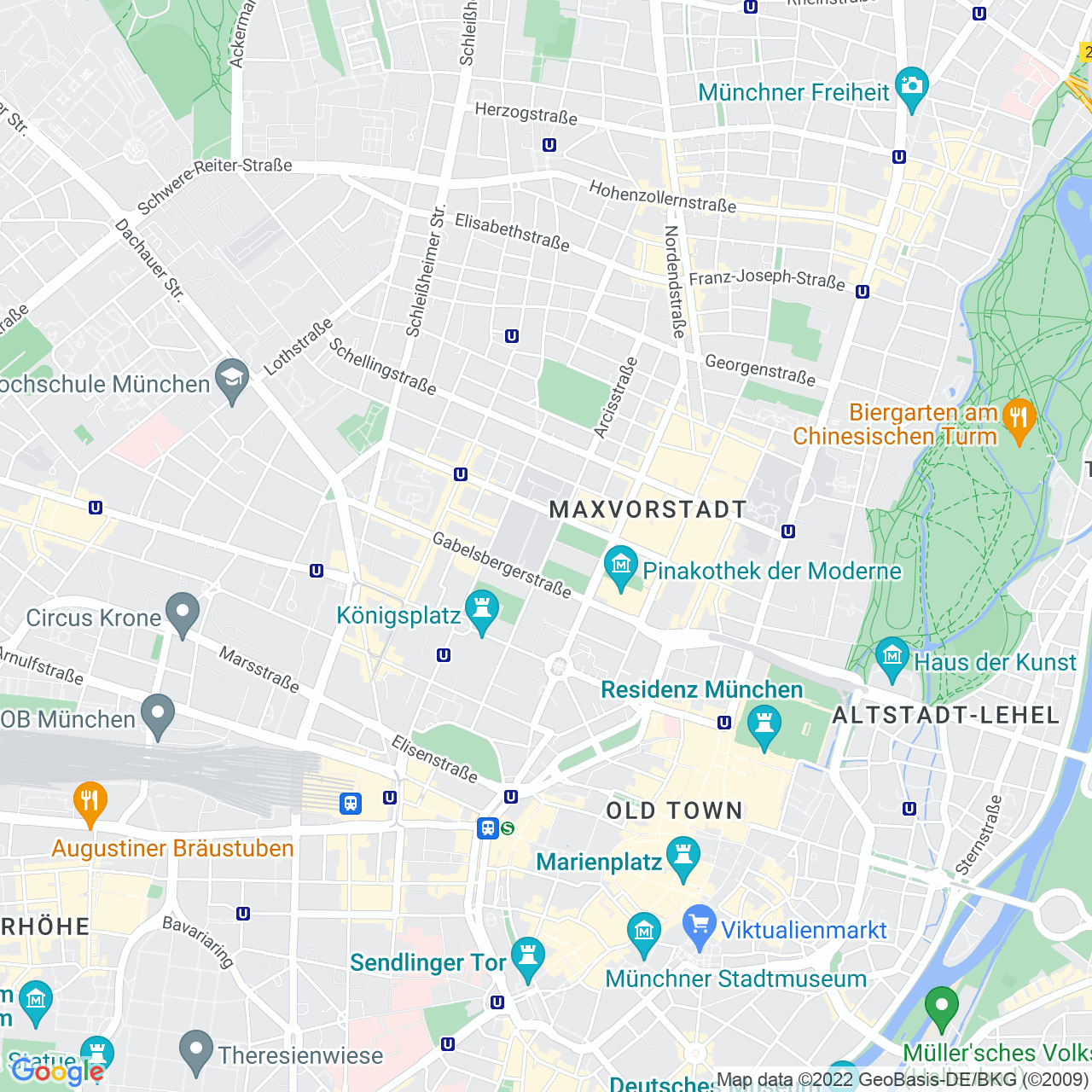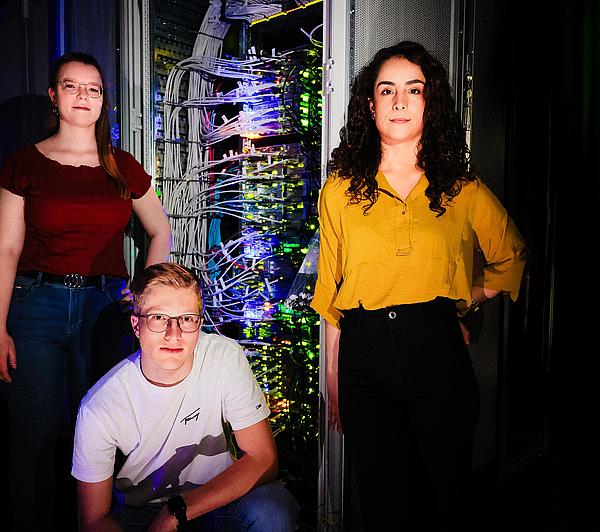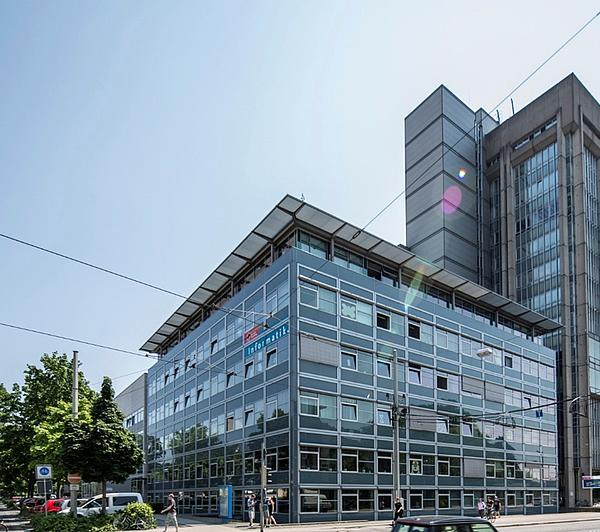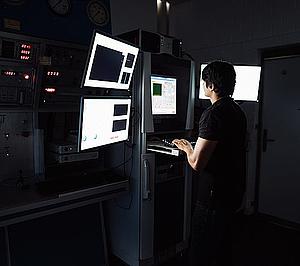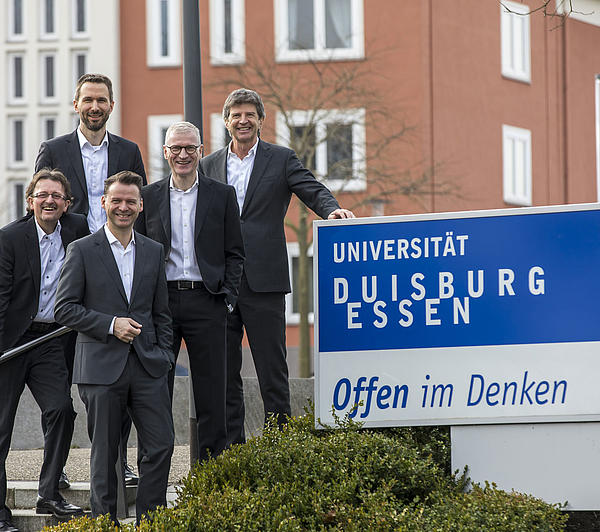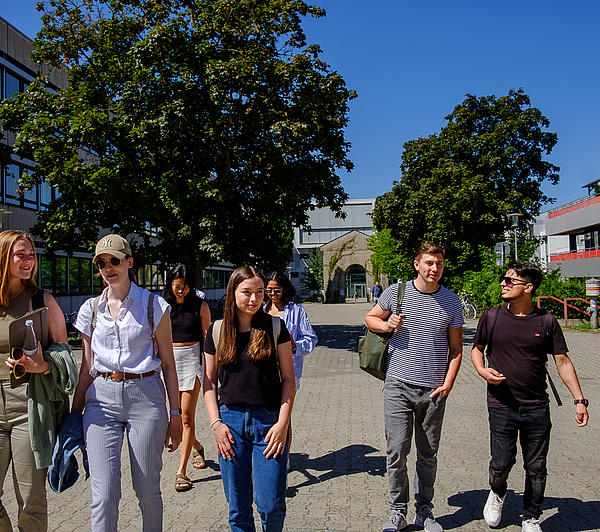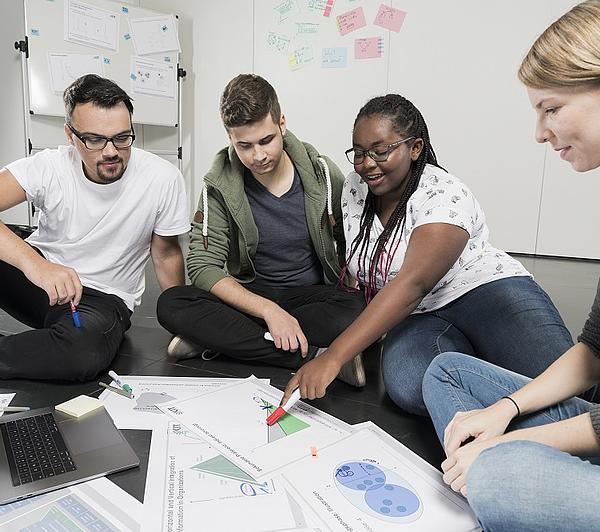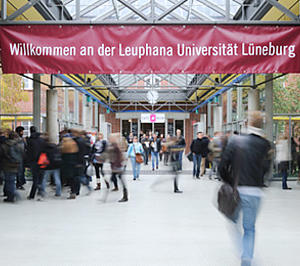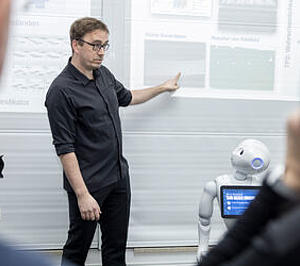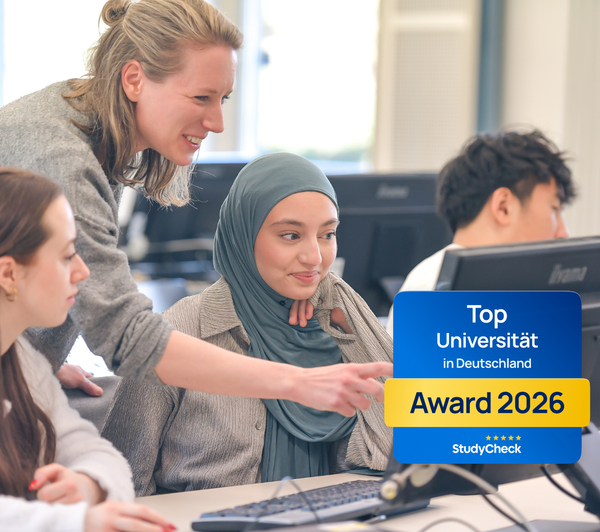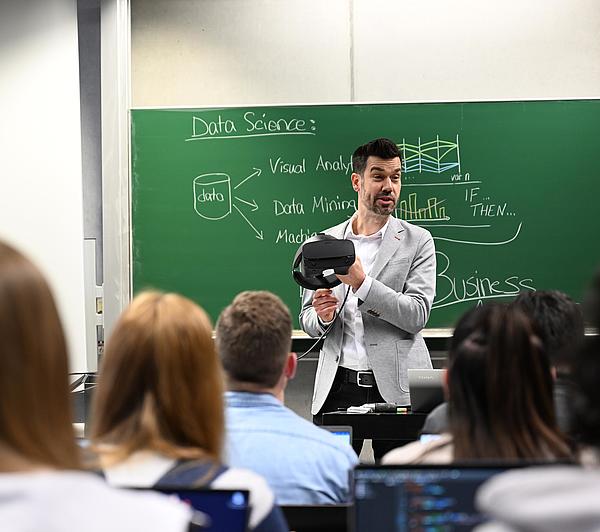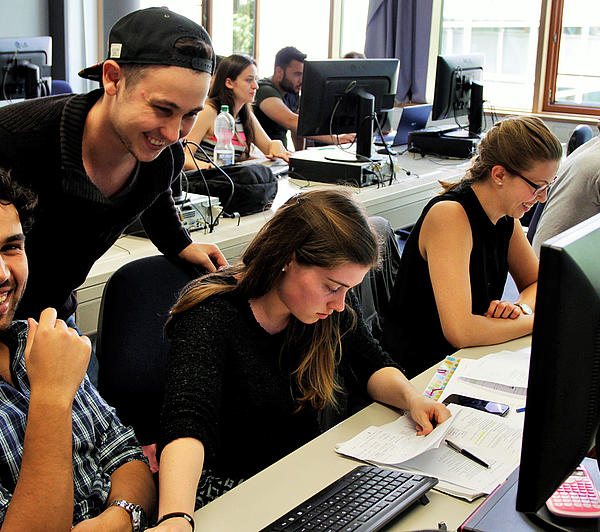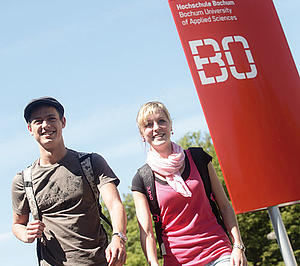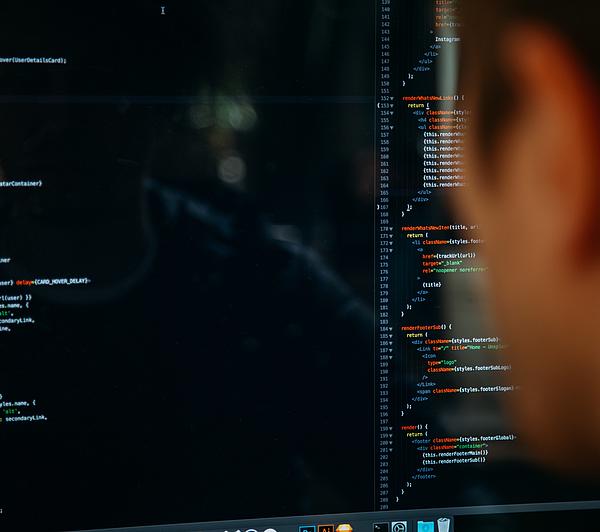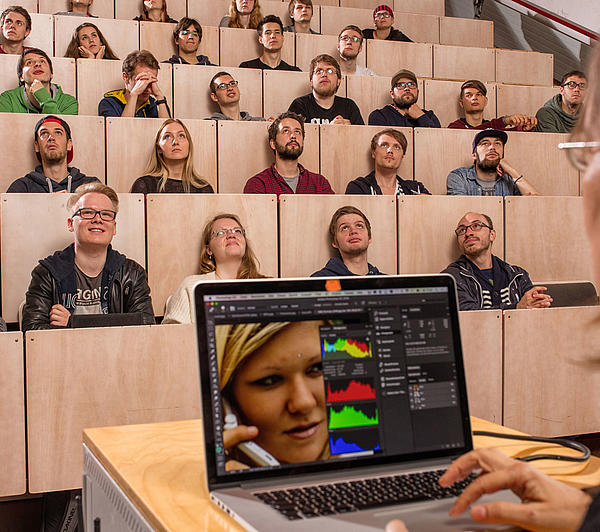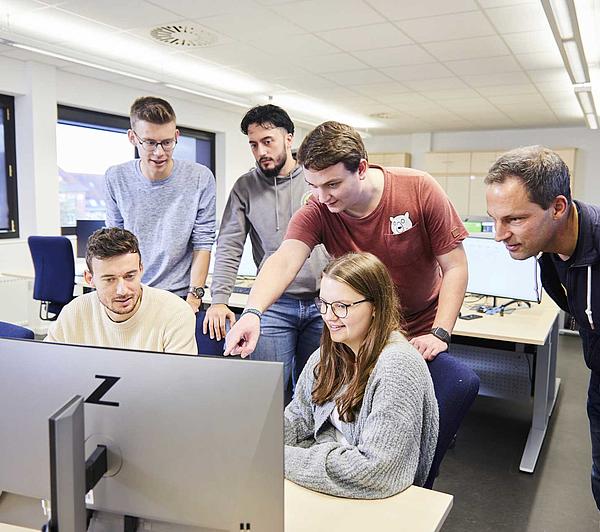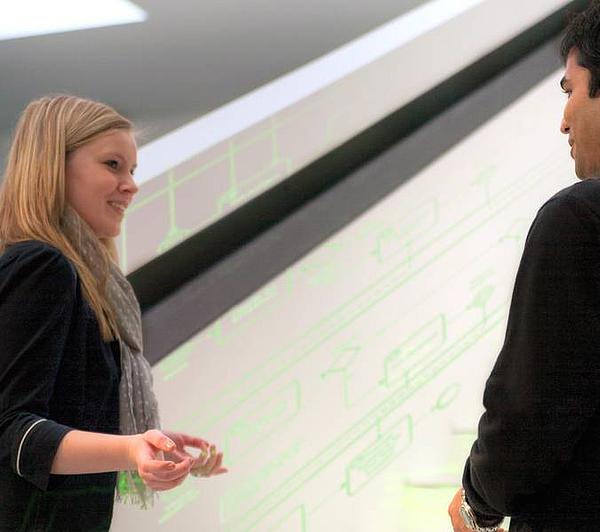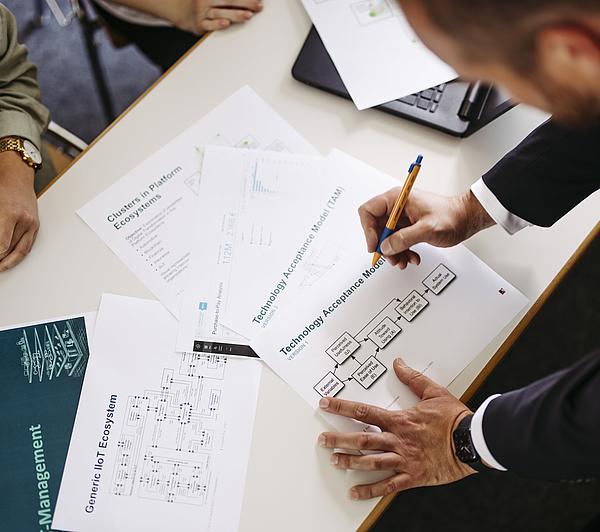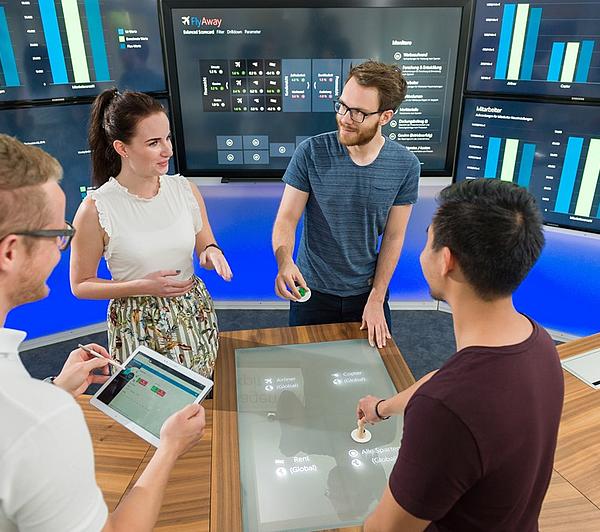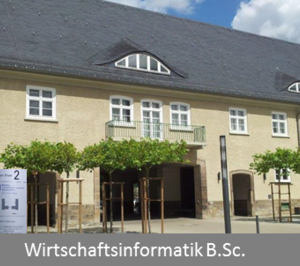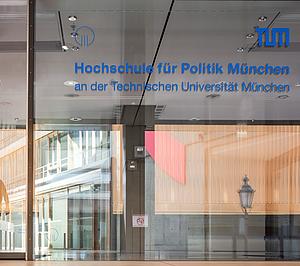Bachelor of Science (ID 86667)
1. Semester
- Diskrete Strukturen (8 CP)
- Einführung in die Informatik 1 (6 CP)
- Einführung in die Wirtschaftsinformatik (5 CP)
- Mathematische Behandlung der NW 1 (6 CP)
- Praktikum: Grundlagen der Programmierung (6 CP)
2. Semester
- Einführung in die Softwaretechnik (6 CP)
- Grundlagen Algorithmen und Datenstrukturen (6 CP)
- Kostenrechnung (6 CP)
- Proseminar (4 CP)
- Statistik (6 CP)
3. Semester
- Buchführung und Rechnungswesen (6 CP)
- Einführung in die Informatik 2 (5 CP)
- Entrepreneurship für Wirtschaftsinformatiker (3 CP)
- Grundlagen Datenbanken (6 CP)
- Software Engineering für betriebliche Anwendungen Bachelorkurs (5 CP)
- Wahlfächer (W)
- 2D grafische Nutzerschnittstellen für Desktop-basierte und mobile Computeranwendungen (5 CP, W)
- 3D Computer Vision (5 CP, W)
- 3D Computer Vision II (5 CP, W)
- Algorithmen des Wissenschaftlichen Rechnens (8 CP, W)
- Algorithmen des Wissenschaftlichen Rechnens II (4 CP, W)
- Algorithmic Game Theory (5 CP, W)
- Analyse von Systemperformanz (3 CP, W)
- Anfrageoptimierung (6 CP, W)
- Anwendungen Wissensbasierter Methoden (5 CP, W)
- Arbeits- und Industriesoziologie (3 CP, W)
- Ausgewählte Themen in algorithmischer Bioinformatik (5 CP, W)
- Automaten und formale Sprachen (8 CP, W)
- Automaten und formale Sprachen II (5 CP, W)
- Automotive Software - Methoden und Technologien (5 CP, W)
- Benutzermodellierung und Recommendersysteme (Computergestützte Gruppenarbeit 2) (3 CP, W)
- Bewegungsplanung in der Robotik (4 CP, W)
- Bildsynthese (4 CP, W)
- Bildverstehen I: Methoden der industriellen Bildverarbeitung (3 CP, W)
- Bildverstehen II: Robot Vision (4 CP, W)
- Cloud Computing (4 CP, W)
- Compilerbau I (5 CP, W)
- Computational Social Choice (6 CP, W)
- Computer Grafik (6 CP, W)
- Computergestützte Gruppenarbeit (3 CP, W)
- Data Mining und Knowledge Discovery (3 CP, W)
- Datenbanksysteme und moderne CPU-Architekturen (6 CP, W)
- Diskrete Simulation (5 CP, W)
- Dreidimensionale Nutzerschnittstellen (5 CP, W)
- Echtzeitsysteme (6 CP, W)
- Effiziente Algorithmen und Datenstrukturen (8 CP, W)
- Effiziente Algorithmen und Datenstrukturen II (8 CP, W)
- Einführung in die digitale Signalverarbeitung (7 CP, W)
- Einführung in die Rechnerarchitektur (Einführung in die Technische Informatik) (8 CP, W)
- Einführung in die Theoretische Informatik (8 CP, W)
- eLearning - Techniken und Infrastrukturen (3 CP, W)
- Elektronisches Publizieren / Document Engineering und das World-Wide Web (5 CP, W)
- Energy Informatics (5 CP, W)
- Entwicklungslinien der Gegenwartsgesellschaft exemplarisch dargestellt anhand der Bildungssoziologie (2 CP, W)
- Erweiterte Realität (5 CP, W)
- Event Processing (5 CP, W)
- Externes Rechnungswesen (6 CP, W)
- Fehlertoleranz (6 CP, W)
- Fortgeschrittene Netzwerk- und Graph-Algorithmen (8 CP, W)
- Gleichungslogik und Lambda-Kalkül (8 CP, W)
- Grundkurs Soziologie III (3 CP, W)
- Grundlagen der Künstlichen Intelligenz (5 CP, W)
- Grundlagen der Programm- und Systementwicklung (6 CP, W)
- Grundlagen von Computer Vision (4 CP, W)
- Grundlagen: Betriebssysteme und Systemsoftware (6 CP, W)
- Grundlegende Mathematische Methoden für Imaging und Visualisierung (5 CP, W)
- High Performance Computing - Programmiermodelle und Skalierbarkeit (4 CP, W)
- Industrial Embedded Systems (2 CP, W)
- Informatikanwendungen in der Medizin (6 CP, W)
- Informatikanwendungen in der Medizin II (5 CP, W)
- Informationsvisualisierung (5 CP, W)
- Innovative Unternehmer - Führung von High-Tech Unternehmen (4 CP, W)
- Integrierte (embedded) Intelligente Systeme (5 CP, W)
- Integrierte Krankenhausinformationssysteme (5 CP, W)
- Internetrecht (3 CP, W)
- Introduction to Service Computing (5 CP, W)
- IT Sicherheit (5 CP, W)
- Komplexitätstheorie (8 CP, W)
- Logik (8 CP, W)
- Maschinelles Lernen (8 CP, W)
- Maschinelles Lernen und Data Mining in der Bioinformatik (8 CP, W)
- Mobile verteilte Systeme (5 CP, W)
- Model Checking (8 CP, W)
- Model Checking II (5 CP, W)
- Modellbildung und Simulation (8 CP, W)
- Modellierung verteilter Systeme (4 CP, W)
- Muster in der Softwaretechnik (5 CP, W)
- Netz- und Systemmanagement (4 CP, W)
- Netzsicherheit (5 CP, W)
- Netzwerkalgorithmen (8 CP, W)
- Netzwerke für den Zahlungsverkehr (3 CP, W)
- Organisation (3 CP, W)
- Organizational Psychology (3 CP, W)
- Parallele Algorithmen (8 CP, W)
- Parallele Numerik (5 CP, W)
- Parallele Programmierung (5 CP, W)
- Personalmanagement (3 CP, W)
- Petrinetze (3 CP, W)
- Programmiersprachen (5 CP, W)
- Programmoptimierung (8 CP, W)
- Projektorganisation und -management in der Softwaretechnik (5 CP, W)
- Prozesse und Methoden beim Testen von Software (5 CP, W)
- Randomisierte Algorithmen (8 CP, W)
- Rechensysteme in Einzeldarstellungen: Mikroprozessoren (4 CP, W)
- Rechnerarchitektur (6 CP, W)
- Referenzmodelle für Informationssysteme (5 CP, W)
- Requirements Engineering (6 CP, W)
- Robotik (6 CP, W)
- Semantik (8 CP, W)
- Sensorgeführte Robotische Manipulation und Lokomotion (3 CP, W)
- Sichere Rechensysteme (5 CP, W)
- Simulation und Animation (4 CP, W)
- Social Computing (4 CP, W)
- Software-Engineering in der industriellen Praxis (3 CP, W)
- Softwarearchitekturen (3 CP, W)
- Transaktionssysteme (6 CP, W)
- Verteilte Anwendungen (5 CP, W)
- Verteilte und Web-Informationssysteme (6 CP, W)
- Virtualisierungstechniken (4 CP, W)
- Virtuelle Maschinen (6 CP, W)
- Volkswirtschaftslehre I (6 CP, W)
- Volkswirtschaftslehre II (6 CP, W)
- Wirtschaftsprivatrecht I (inkl. juristischer Fallbearbeitung) (6 CP, W)
- Wirtschaftsprivatrecht II (inkl. juristischer Fallbearbeitung) (6 CP, W)
- Wissensbasierte Systeme für industrielle Anwendungen (4 CP, W)
- Wissenschaftliche Visualisierung (4 CP, W)
4. Semester
- Empirical Research Methods (6 CP)
- Grundlagen Rechnernetze und verteilte Systeme (6 CP)
- Informationsmanagement (5 CP)
- Planen und Entscheiden in betrieblichen Informationssystemen (5 CP)
- Projektorganisation und -management in der Softwaretechnik (5 CP)
- Seminar (4 CP)
5. Semester
- Bachelor-Praktikum (Projekt Systementwicklung) (10 CP)
- Investitions- und Finanzmanagement (6 CP)
- Middleware und Verteilte Systeme (5 CP)
- Wahlfach Überfachliche Grundlagen (6 CP)
6. Semester
- Bachelor's Thesis (12 CP)
- Bachelorkolloquium (5 CP)
- Bachelorprojekt (8 CP)
Master of Science (ID 86668)
1. Semester
- Business Analytics (5 CP)
- CIO Planspiel (8 CP)
- Management Accounting (6 CP)
- Softwaretechnik (5 CP)
- Wahlfächer (W)
- Challenges for the CIO (3 CP, W)
- IT und Unternehmensberatung (3 CP, W)
- IT-Management im Public Sector (3 CP, W)
- Strategisches IT-Management (3 CP, W)
2. Semester
- Einsatz und Realisierung von Datenbanksystemen (6 CP)
- Software Engineering für betriebliche Anwendungen (5 CP)
- Advanced Planning in Supply Chains - Illustrating the Concepts using an SAP APO Case Study (6 CP, W)
- Advanced Seminar Entrepreneurship (6 CP, W)
- Advanced Seminar Innovation (6 CP, W)
- Advanced Seminar Marketing, Strategy & Leadership (6 CP, W)
- Advanced Seminar Operations & Supply Chain Management (6 CP, W)
- Advanced Topics in Operations & Supply Chain Management I (OSCM) (6 CP, W)
- Advanced Topics Operations & Supply Chain Management I (6 CP, W)
- Advanced Topics Operations & Supply Chain Management II (6 CP, W)
- Case Study Seminar: Strategic Entrepreneurship for a Digital Economy (6 CP, W)
- Designing and Scheduling Lean Manufacturing Systems (6 CP, W)
- Discrete Optimization (6 CP, W)
- Entwicklungspraktikum Internetbasierte Geschäftssysteme (10 CP, W)
- Entwicklungspraktikum Software Engineering für betriebliche Informationssysteme (10 CP, W)
- Entwicklungspraktikum Unternehmenssoftware (10 CP, W)
- Inventory Management (6 CP, W)
- Marketing Entrepreneurship Lab (6 CP, W)
- Planning and Scheduling of Complex Operations: Models, Methods and Applications (6 CP, W)
- Sponsoring und dessen Implementierung im Marketing (6 CP, W)
- Sponsorship-linked Marketing (Online-Kurs) (6 CP, W)
- Stochastic Modeling and Optimization (6 CP, W)
- Technology Entrepreneurship Lab (6 CP, W)
- Transportation Logistics (6 CP, W)
3. Semester
- Informations- und Wissensmanagement (5 CP)
- Überfachliche Grundlagen (3 CP)
- Übergreifendes Wahlmodul (17 CP)
- Verteilte Systeme (5 CP)
4. Semester
- Master Thesis (30 CP)


